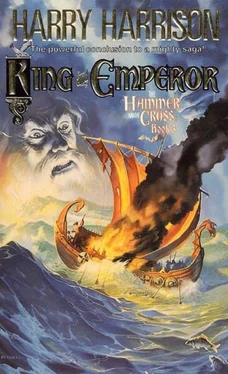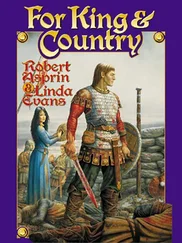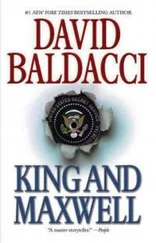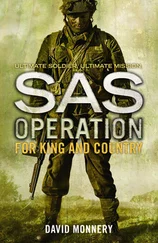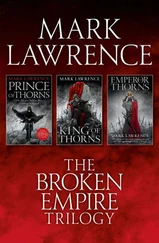By the year of Our Lord 875—for the chroniclers of the Asgarth Way kept to the Christian count while they rejected the Christian Lord—his capital was established, his policy bearing fruit: sometimes sweet, as often sour.
High in the sky, small white clouds scudded before the strong wind from the south-west. Their shadows raced across the bright green of new grass, across the strong rich brown of plow-furrows, the heavy horse teams drawing slow lines across the springtime fields. In between the sun shone, hot and welcome on England emerging from its winter sleep. Emerging too, many said, from the long dark into a new day and a new spring under its young ruler and his iconoclastic but fortunate rule.
In the market place of rustic Stamford maybe as many as two thousand people were gathered to witness the strange experiment that had been promised. The thanes and churls crowded in from the fields, wives and children with them, pushing back their hoods to take the sun, even shedding their cloaks with due caution against the return of the spring showers. The slow heavy faces showed pleasure, wonder, even excitement. For today someone would indeed show a new kind of courage that not even Ivar the Boneless or his brother Sigurth the Snake-eye might have matched. Today a man would leap from the great stone tower of the House of Wisdom itself. And fly!
Or so it was said. The crowd would be happy to see flight, to tell their children and grandchildren about it ever after. But they would be happy also to see dramatic fall. They munched bread and good blood-sausage in even-tempered expectation of either.
A blare of horns set the spectators moving slowly to either side of the square, as towards them from the king's great hall came the king himself and his guests and officers. At the head, walking with deliberate ceremonial just behind the troop of champions blasting challenge from their enormous, long-preserved aurochs horns, came the two kings themselves, Shef and his guest and partner Saxon Alfred. Those who had not seen them before stared uncertainly at the contrasting figures, wondering—till their better-informed neighbors hissed the truth in their ears—which was the mighty one, which the tolerated partner. Indeed it was Alfred who caught the eye, dressed like a king in scarlet cloak, sky-blue tunic, gold circlet on yellow hair, left hand resting easily on the gold hilt of an ancient sword.
The man beside him wore scarlet also, a cloak of wool woven so fine it seemed as soft as its magnificent silk lining. But the tunic and breeches beneath it were plain dark gray. The king carried no sword, indeed no weapon at all, stalking along with his thumbs in his belt like a churl coming home from the plow. And yet, if one looked closer, it seemed possible that this was after all the man the Norse-folk called Ivarsbani, Sigurtharbani , the man who had killed both Ivar the Boneless and Sigurth the Snake-eye with his own hands, and King Kjallak the Strong of the Swedes as well. Had overthrown too the power of Charles the Bald and his Frankish horsemen at Hastings, in the year of Our Lord 866.
The king was now in his late twenties, and he had the body of a swordsmith in his prime: broad shoulders, powerful hands, a stride that swung from the hips, a waist so narrow he might have traded belts with his wife—if he had had one. Yet his face was that of a man much older. The black hair was streaked, and more than streaked with gray over the temples. More gray showed in the short clipped beard. The king's right eye was covered with a plain black patch, but round it men could see the flesh drawn in, wasted, the one cheek hollow. Lines of care ran across his brow, an expression of constant pain. Or was it regret? Men said that he had returned from his duel with the last of the Ragnarssons friendless and alone, having bought his life and his victory with the loss of others. Some said he had left his luck behind on the battlefield with his dead friends. Others, better-informed, said that his luck was so great that he drained it from others, brought death to those who came too close.
Whatever the truth, the king felt no need to display wealth or rank or power. He wore no crown, no fine jewelry, gave no employment to cunning goldsmiths. Round his arms, though, there ran half a score of golden bracelets, plain and unworked: worn without show, as if they were merely money.
Behind the two kings came their retinues, chamberlains, bodyguards, Shef's swordbearer, Viking sub-kings and English aldermen of shires anxious to be near the center of power. Close on Shef's heels strode one man who brought murmurs of wonder to the rustics in from the fields, a man nearer seven foot than six, and one who would never see twenty stone again, nor twenty-five, a man head and shoulders above all but the mightiest even of the picked bodyguards: Brand the Viking, Champion now of all of Norway and not only of his native Halogaland, rumored in whispers even in the depths of England to be the relative of trolls and a kinsman of marbendills of the deep. Few knew the truth of what had happened when the king had been hunted into the farthest north, and few dared to enquire.
“But where is the man who is to fly?” whispered one anxious rustic to his town-dwelling cousin. “The man dressed like a bird?”
“Already in the Wisdom House with the priests,” came the reply. “He feared his feather-hame, his coat of birds' feathers, might be crushed in the press. Follow the kings now, and we shall see.”
Slowly the crowd closed in behind the royal procession, and trailed them down the hard stone of the Great North Road itself. Not to the town walls, for in demonstration of power Stamford had none: its defenses lay far out at sea, in the catapult-mounting battleships that had crushed Vikings and Franks alike. But to the edge of the wooden huts of the common folk, where beyond them in a meadow stood the great square of dormitories, workshops, forges, stables and storerooms that was the College of the Way in England, with lifting over it the tall sails of windmills. And at its center the stone tower Shef had ordered to outstrip the works of the Christian kings: sixty feet high and forty square, its blocks of stone so massive that visiting churls could not believe they had been raised by men with cranes and counterweights, but told strange tales of devils compelled by magic.
The kings and dignitaries entered the high iron-bound doorway. The common crowd spread itself round in an expectant semi-circle, gaping up.
As he reached the top of the staircase, Shef stepped ahead of his co-king for the first time and walked out onto the flat roof, surrounded by battlements. Thorvin was there to meet him, dressed as always in the plain but shining white of a priest of the Way, silver hammer round his neck as a sign of his devotion to Thor, a real double-headed hammer tucked into his belt as a reminder of his craft. Behind him, but surrounded by other priests, was the man who was to fly.
Shef walked thoughtfully towards him. The man was dressed in a woolen suit of the plainest homespun, but not the usual tunic and breeches. Instead what he wore seemed to have been cut and sewn as one piece, to fit as tightly as possible. But round him and disguising his body-suit was a cape. Shef looked closer, still unspeaking. Thousands upon thousands of feathers, not stuck into some other material, wool or linen, but sewn tightly, quill to quill. The cape was strapped with sinews to wrists and ankles, stitched also along the line of the shoulders and down the back. It hung loose, though, round the man's sides.
Suddenly the man, meeting the king's eye, threw his arms wide and straddled his legs. The cape took shape, like a web, like a sail. Shef nodded, recognizing what was intended.
“Where do you come from?”
Читать дальше
